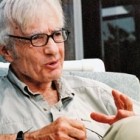
Автор
Роберт Джей Лифтон — новинки
- 3 произведения
- 6 изданий на 3 языках
-
Технология "Промывки мозгов" Роберт Джей Лифтон
ISBN: 5-93878-162-0, 0-8078-4253-2 Год издания: 2005 Издательство: Прайм-Еврознак Язык: Русский Эта книга является анализом опыта пятнадцати китайских граждан и двадцати пяти уроженцев Запада, которые подверглись «промыванию мозгов» со стороны коммунистического китайского правительства. Роберт Лифтон выстраивает эти «истории болезни» («досье по делу») посредством личных бесед и намечает в общих чертах некий тематический паттерн «смерти и возрождения», сопровождающийся чувством вины, которое характерно для процесса «реформирования мышления». Совершенно очевидно, что советский коммунистический режим сделал свой важный вклад в «исправление мышления» — наиболее конкретно в неустанных методах извлечения признания и более широко в марксистско-ленинистском акценте на критику, самокритику и «идеологическую борьбу». Но, в конце концов, эта книга не столько о Китае или России, сколько об определённой психологической склонности человеческого сознания к идеологическому тоталитаризму — к бескомпромиссным претензиям на абсолютную истину и нравственность. -
Destroying the World to Save It: Aum Shinrikyo, Apocalyptic Violence, and the New Global Terrorism Роберт Джей Лифтон
ISBN: 0805065113, 9780805065114 Год издания: 2000 Издательство: Henry Holt and Company The premise of Destroying the World to Save It is terrifying: after studying the history of the Japanese cult Aum Shinrikyo (instigators of a 1995 nerve gas attack on a Tokyo subway), the author believes them to be only one group in a "loosely connected, still-developing global subculture of apocalyptic violence." We ignore this subculture, says National Book Award winner Robert Jay Lifton, at our future peril. In interviews with former Aum members once led by the guru figure Shoko Asahara, it is their "familiar ordinariness" that most disturbs Lifton. Drawing parallels to his studies of Nazi psychology, he notes that--just as in Germany--practicing doctors and trained scientists were persuaded to join Aum and offer their specialized knowledge in the service of the cult's plans. The story of Aum, says Lifton, has for the first time shown the world that not only other states but more elusive groups less open to diplomacy may be able to gain control of weapons of mass destruction.
While Destroying the World to Save It is a deeply researched and intelligent psychological analysis, Lifton's conclusion is nevertheless unsatisfying. While surmising that those who next attempt to carry out an apocalyptic plan may be more powerful and competent than Aum, he does not really present a good suggestion for how to prevent their success, offering only a psychologist's "plea for awareness." One hopes his study will encourage activism against global terrorism as well. -- Maria Dolan -
The Nazi Doctors: Medical Killing And The Psychology Of Genocide Robert Jay Lifton
ISBN: 0465049052 Год издания: 2000 Издательство: Basic Books Язык: Английский Nazi doctors did more than conduct bizarre experiments on concentration-camp inmates; they supervised the entire process of medical mass murder, from selecting those who were to be exterminated to disposing of corpses. Lifton (The Broken Connection; The Life of the Self shows that this medically supervised killing was done in the name of "healing," as part of a racist program to cleanse the Aryan body politic. After the German eugenics campaign of the 1920s for forced sterilization of the "unfit,"it was but one step to "euthanasia," which in the Nazi context meant systematic murder of Jews. Building on interviews with former Nazi physicians and their prisoners, Lifton presents a disturbing portrait of careerists who killed to overcome feelings of powerlessness. He includes a chapter on Josef Mengele and one on Eduard Wirths, the "kind," "decent" doctor (as some inmates described him) who set up the Auschwitz death machinery. Lifton also psychoanalyzes the German people, scarred by the devastation of World War I and mystically seeking regeneration. This profound study ranks with the most insightful books on the Holocaust. -
Hiroshima in America: A Half Century of Denial Роберт Джей Лифтон, Greg Mitchell
ISBN: 9780380727643 Год издания: 1996 Издательство: Harper Perennial A study of the events surrounding the Hiroshima bombing focuses on its affects in America, considering the cover-up efforts by the government and linking the bombing to current insensitivities toward violence. -
Cults in Our Midst Роберт Джей Лифтон
ISBN: 9780787967413 Год издания: 1995 Издательство: Jossey-Bass Язык: Английский Cults today are bigger than ever, with broad ramifications for national and international terrorism. In this newly revised edition of her definitive work on cults, Singer reveals what cults really are and how they work, focusing specifically on the coercive persuasion techniques of charismatic leaders seeking money and power. The book contains fascinating updates on Heaven's Gate, Falun Gong, Aum Shinrikyo, Hare Krishna, the Reverend Sun Myung Moon, and the connection between cults and terrorism in Al Queda and the PLO. -
Thought Reform and the Psychology of Totalism: A Study of Brainwashing in China Роберт Джей Лифтон
Год издания: 1989 Издательство: University of N. Carolina Press Informed by Erik Erikson's concept of the formation of ego identity, this book, which first appreared in 1961, is an analysis of the experiences of fifteen Chinese citizens and twenty-five Westerners who underwent "brainwashing" by the Communist Chinese government. Robert Lifton constructs these case histories through personal interviews and outlines a thematic pattern of death and rebirth, accompanied by feelings of guilt, that characterizes the process of "thought reform." In a new preface, Lifton addresses the implications of his model for the study of American religious cults.





